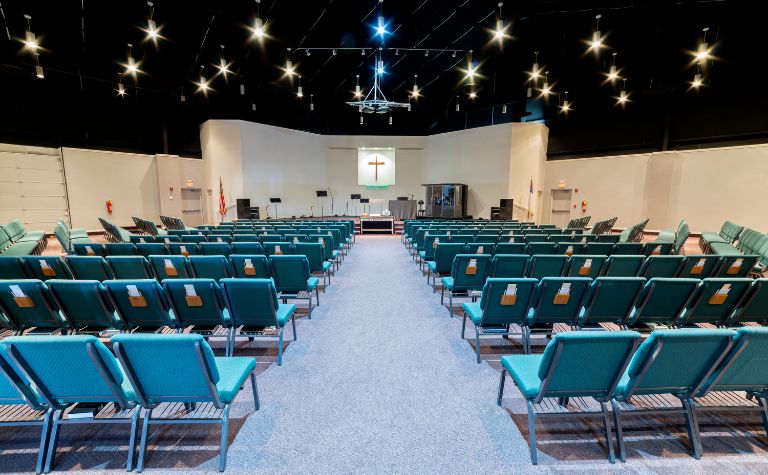There are a lot of names, titles, and labels within various Christian traditions, and it can be easy to confuse them. Many people generally know that “Assemblies of God” and “Pentecostalism” are associated but don’t know how they fit together.
Pentecostalism is a movement within 20th-century Protestant Christianity that gave birth to denominations like the Church of God, the Foursquare Church, and the Assemblies of God. Speaking in tongues and the availability of all spiritual gifts for the church today characterize Pentecostal theology.
See the Assemblies of God vs. Pentecostalism Comparison Chart below. Also, learn the answers to these questions: What are some examples of Pentecostal denominations and churches that aren’t associated with the Assemblies of God? What makes the Assemblies of God unique among Pentecostal denominations? Keep reading to learn more.
Also, see Assemblies of God vs. Church of God: Differences to learn more.

Is Assemblies of God the Same as Pentecostal?
The Assemblies of God and the Pentecostal movement are closely related but not synonymous. Pentecostalism is a theological system that the Assemblies of God and other denominations hold as true.
In other words, all Assemblies of God churches are Pentecostal, but not all Pentecostal churches are Assemblies of God. (Also see Assemblies of God vs. Foursquare: What’s the Difference?)
| OVERVIEW | Assemblies of God | Pentecostalism |
|---|---|---|
| Founder | Pentecostal pastors and leaders | there is no single founder |
| Origin | Hot Springs, Arkansas, 1914 | Azusa Street Revival, Los Angeles, California, 1906 |
| Early influencer(s) | Charles Fox Parham (1873-1929), Agnes Ozman (1870–1937), William Joseph Seymour (1870-1922) | Charles Fox Parham (1873-1929), Agnes Ozman (1870–1937), William Joseph Seymour (1870-1922) |
| Significant writing outside the Bible | The Apostles’ Creed, The Nicene Creed, The 16 Fundamental Truths | The Apostles’ Creed, The Nicene Creed, various denominational belief statements |
| Organization | Assemblies of God churches are organized according to presbyterian polity (though not theology), at the national level as well as the regional or district level. Individual churches are self-governing. | Most Pentecostal churches are self-governing with the district or regional organizations. |
| Divisions | Compared with other large Protestant denominations, the Assemblies of God has been free of significant splits. The internal debate has occurred over a number of issues, but the denomination has avoided large protesting factions. | Pentecostals don’t agree on all matters. For example, the Church of God (Cleveland, Tennessee) holds to the doctrine of perfectionism, while the Assemblies of God doesn’t. |
| Theological and Social worldview | The Assemblies of God denomination is evangelical and conservative, theologically and socially. The denomination ordains women to be pastors, which some Christians consider liberal and progressive. | Pentecostal denominations and churches tend to be conservative theologically and in relation to social issues. |
Also see Assemblies of God vs. Church of God: What’s the Difference?

Pentecostal Churches That Aren’t Assemblies of God
The Asuza Street Revival in Southern California in 1906 produced several Pentecostal denominations and churches in America and around the world.
Below is a partial list of Pentecostal denominations or churches that aren’t associated with the Assemblies of God. (Also see Assemblies of God vs. Catholic: What’s the Difference?)
Well-known Pentecostal denominations include:
- Apostolic Faith Church
- Church of God (Cleveland, Tennessee)
- Church of God in Christ
- The Foursquare Church
- Calvary Chapel (more of a network than a denomination)
Well-known Pentecostal churches include:
- Bethel Church (Redding, California); pastor: Bill Johnson
- Hillsong (Australia); founding pastor: Brian Houston
- Dream Center (Los Angeles, California); president: Matthew Barnett
- World Harvest Church (Columbus, Ohio); pastor: Rod Parsley
Matters of doctrinal agreement: the Assemblies of God and other Pentecostal churches have much more in common than not. (Also see What Does Assemblies of God Believe About Alcohol?)
| BELIEFS | Assemblies of God | Pentecostalism |
|---|---|---|
| Theology (general) | Assemblies of God is Protestant. They believe that salvation is by grace through faith in Christ alone and not according to works. | same |
| Theology (specific) | Assemblies of God are Arminian. Within the framework of Arminianism, their belief systems is often referred to as “Pentecostal theology.” | same |
| God | Assemblies of God believe in the Trinity. There is one God who exists in three persons. | Mainline Pentecostal churches believe in the Trinity; some groups that identify as Pentecostal like Oneness Pentecostals deny the Trinity |
| Is Jesus God? | Yes | same |
| Is the Holy Spirit God? | Yes | same |
| The Bible | #1 of The 16 Fundamental Truths state, “The Scriptures, both the Old and New Testaments, are verbally inspired of God and are the revelation of God to man, the infallible, authoritative rule of faith and conduct.” In other documents, the denomination affirms the doctrine of inerrancy. | same |
| View of the atonement | Assemblies of God believes in the penal-substitutionary atonement of Christ. His death was the punishment for sin, and he took the place of sinners on the cross. | same |
| BELIEFS | Assemblies of God | Pentecostalism |
|---|---|---|
| Salvation | #5 of The 16 Fundamental Truths state, “Salvation is received through repentance toward God and faith toward the Lord Jesus Christ. By the washing of regeneration and renewing of the Holy Spirit, being justified by grace through faith, man becomes an heir of God, according to the hope of eternal life.” | same |
| Church offices | Assemblies of God doesn’t recognize offices like Apostle for the modern church. | Some Pentecostal traditions have modern-day Apostles. |
| Spiritual gifts | Assemblies of God believes that all spiritual gifts mentioned in the Bible are operational today, including speaking in tongues, divine healing, and miracles. | same |
| Water Baptism | Believer’s baptism; only professing believers, not infants, are baptized. Baptism isn’t necessary for salvation. | same |
| Communion | #6 of The 16 Fundamental Truths state, “The Lord’s Supper, consisting of the elements — bread and the fruit of the vine — is the symbol expressing our sharing the divine nature of our Lord Jesus Christ, a memorial of his suffering and death, and a prophecy of His second coming, and is enjoined on all believers ’till He comes!'” | same |
| Sanctification/ Perfectionism | The Assemblies of God strongly affirms the importance of sanctification. The denomination denies the doctrine of perfectionism, which states that a Christian can stop sinning completely in this lifetime. | Some Pentecostal denominations, like the Church of God (Cleveland, Tennessee), hold to perfectionism. |
| Eschatology | #14 of The 16 Fundamental Truths state, “The second coming of Christ includes the rapture of the saints, which is our blessed hope, followed by the visible return of Christ with His saints to reign on earth for one thousand years.” | same |

Baptism In the Holy Spirit and Speaking In Tongues
At the core of Pentecostal theology is the conviction that baptism in the Holy Spirit is subsequent to — meaning it occurs after — conversion. Most non-Pentecostal belief systems affirm the baptism but argue that it occurs at the time of conversion.
Also at the core of Pentecostalism is that the initial evidence of baptism in the Holy Spirit is speaking in tongues. In non-Pentecostal belief systems, baptism in the Holy Spirit can be verified in different ways.
In the 16 Fundamental Truths of the Assemblies of God, #7 describes baptism in the Holy Spirit. All Pentecostal denominations would agree with the statement:
“All believers are entitled to and should ardently expect and earnestly seek the promise of the Father, the baptism in the Holy Spirit and fire, according to the command of our Lord Jesus Christ. This was the normal experience of all in the early Christian Church. With it comes the enduement of power for life and service, the bestowment of the gifts and their uses in the work of the ministry.”
In the 16 Fundamental Truths, #8 is about speaking in tongues. All Pentecostal denominations would agree with the statement:
“The baptism of believers in the Holy Spirit is witnessed by the initial physical sign of speaking with other tongues as the Spirit of God gives them utterance.”
Baptism in the Holy Spirit results in speaking in tongues, but there are other effects as well:
- An overflowing fullness of the Spirit, John 7:37-39, Acts 4:8
- A deepened reverence for God, Acts 2:43, Hebrews 12:28
- An intensified consecration to God and dedication to His work, Acts 2:42
- And a more active love for Christ, for His Word, and for the lost Mark 16:20
While baptism in the Holy Spirit and speaking in tongues is at the core of Pentecostal theology, divine healing is also important. In the 16 Fundamental Truths, #12 is about healing. All Pentecostals would agree with the statement:
“Divine healing is an integral part of the gospel. Deliverance from sickness is provided for in the atonement, and is the privilege of all believers.”
Bible Verses About Pentecostal Theology
Baptism in the Holy Spirit after conversion, not simultaneous with it:
- 1 Corinthians 12:13, “For in one Spirit we were all baptized into one body—Jews or Greeks, slaves or free—and all were made to drink of one Spirit.” (ESV)
- Acts 2:38, “And Peter said to them, ‘Repent and be baptized every one of you in the name of Jesus Christ for the forgiveness of your sins, and you will receive the gift of the Holy Spirit.'” (ESV)
- Acts 1:8, “But you will receive power when the Holy Spirit has come upon you, and you will be my witnesses in Jerusalem and in all Judea and Samaria, and to the end of the earth.” (ESV) (Also see What Bible Translation Does Assemblies of God Use?)
Speaking in tongues as the initial evidence of baptism in the Holy Spirit:
- 1 Corinthians 14:27-28, “If any speak in a tongue, let there be only two or at most three, and each in turn, and let someone interpret. But if there is no one to interpret, let each of them keep silent in church and speak to himself and to God.” (ESV)
- Acts 2:4, “And they were all filled with the Holy Spirit and began to speak in other tongues as the Spirit gave them utterance.” (ESV)
- Mark 16:17, “And these signs will accompany those who believe: in my name they will cast out demons; they will speak in new tongues.” (ESV)
Miraculous gifts, healing, words of wisdom, words of knowledge:
- 1 Peter 2:24, “He himself bore our sins in his body on the tree, that we might die to sin and live to righteousness. By his wounds you have been healed.” (ESV)
- James 5:15, “And the prayer of faith will save the one who is sick, and the Lord will raise him up. And if he has committed sins, he will be forgiven.” (ESV)
- Matthew 10:1, “And he called to him his twelve disciples and gave them authority over unclean spirits, to cast them out, and to heal every disease and every affliction.”
Please see the related articles below.
References:
[1] Source
[2] Source
[3] Source
Related Questions
The Assemblies of God and Baptist traditions are sizable and significant branches of Protestant Christianity. They each have a fascinating history in Europe, America, and as of the twenty-first...
The Assemblies of God and the Church of God (Cleveland, Tennessee) are two of the oldest Pentecostal denominations in the world. There is a lot that unites these Protestant-Christian traditions, yet...
